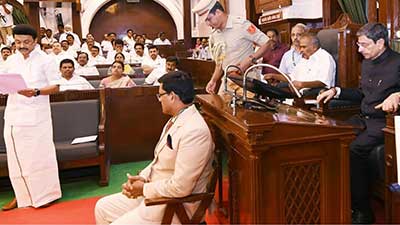Date: 18/01/2023
Relevance: GS-2: State Legislatures—Structure, Functioning, Conduct of Business, Powers & Privileges and Issues Arising out of these.
Key Phrases: Article 176 of the Constitution, Governor’s address, Article 175, policies and programs of the elected government, Executive accountability, Shamsher Singh case.
Why in news?
- The Governor of Tamil Nadu, in the customary Governor’s address to Members of the Tamil Nadu Assembly (the first session for 2023), skipped an important and politically significant paragraph, which has stirred up a hornet’s nest of controversy in the State.
What is the issue?
- The paragraph in question referred to the Dravidian model of governance which has great political and cultural significance, especially in Tamil Nadu.
- The present Governor is known to have no emotional link with the concept of a Dravidian model of governance or politics or its rich cultural past (evident in his speeches and observations), which is understandable.
- The issue here is not one of the Governor’s personal likes or dislikes of a particular political ideology or a cultural tradition, but whether the constitutional authority can deviate from well-established and mandatory constitutional practices while performing a constitutional function.
It is a complete address:
- Article 176 of the Constitution requires the Governor to mandatorily address the Members of the legislature at the commencement of the first session of each year and to inform them of the causes of its summons.
- Article 176 (2) says that the legislature will discuss the matters referred to in such an address.
- The “address” here means the complete address and not a truncated or garbled version.
- Therefore, what the Governor reads before the legislators is a complete address whose entire contents are to be mandatorily discussed by the legislators in the House.
Importance of the Governor’s address:
- The Constitution gives a specific direction to the House to find time to discuss the contents of the Governor’s address.
- It is of special significance that the Constitution nowhere else says that the legislature must make rules for the allotment of time to discuss a particular matter other than the address by the Governor under Article 176.
- This underscores the importance the Constitution attaches to such an address by the Governor.
- Through the address of the Governor, the government informs the legislature of its major legislative programs for that year, its achievements in the previous year, and a clear outline of its developmental programs for the future.
- These programs and policies of the government are conveyed to the legislature through the Governor. Thus, the address under Article 176 assumes great importance.
Difference between the ‘address’ under articles 175 and 176:
- Mandatory address:
- Article 175 says that the Governor may address the legislature and for that purpose require the attendance of the members.
- The Governor’s address under Article 175 is not a mandatory address unlike under Article 176.
- Discussion of the content:
- Article 175 does not speak about any discussion of the content of such an address, but Article 176 requires a discussion on the matters contained in the Governor’s address.
- Executive accountability:
- The reason behind the Constitution making such a distinction in two addresses by the same constitutional authority, namely the Governor, to the same Members of the legislature, is that the address under Article 176 contains the policies and programs of the elected government of the State which is accountable to the legislature.
- Executive accountability to the elected representatives of the people is the essence of parliamentary democracy.
Content by the government:
- The address the Governor gives under Article 176 is the address prepared by the government. Thus, skipping paragraphs of the address would simply mean that the Governor does not approve or agree with those ideas.
- It does not contain any of the personal views of the Governor but only the policies and the programs of the elected government.
- The government alone is responsible for the content of the address and not the Governor.
Can the Governor skip or add anything of his own?
- The Governor cannot change a word on his own. So, by wilfully not reading certain portions of the address the Governor has gone against the mandate of Article 176.
- It is another matter if the Governor is not able to read the whole speech because of a ruckus created by Members of the Assembly.
- But the Governor cannot wilfully skip paragraphs of the address because the Constitution does not permit him to disagree with the matters contained in the address or interpose his own views therein.
Conclusion:
- From Shamsher Singh (1974) to Nabam Rebia (2016), the Supreme Court has consistently held that Governors can act only on the aid and advice of the Council of Ministers and cannot exercise any executive powers independently ignoring the elected government.
- B.R. Ambedkar said in the Constituent Assembly: “If the Constitution remains in principle the same, as we intend that it should be, that the Governor should be a purely constitutional Governor, with no power of interference in the administration of the province, ....”
- These are voices of wisdom that should be heeded if we want to preserve the integrity of the system. If constitutional authorities wilfully cross the line and overstrain the system, democracy will be in peril.
Source: The Hindu
Mains Question:
Q. “The mandatory address the Governor of a State gives under Article 176 contains only the policies and programs of the elected government, so wilfully skipping or adding certain portions goes against the mandate of the said Article.” Discuss.






















